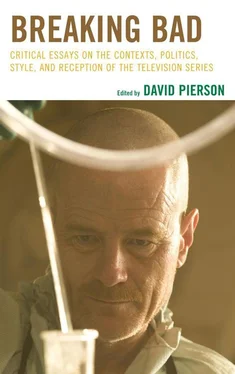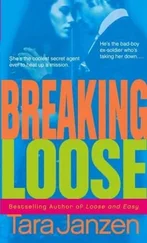In “Full Measure” (6/13/10), we see a flashback of Walter and a pregnant Skyler entering their new house, approximately in 1990, when Walt was working at the Sandia National Laboratory, a real life Albuquerque-based company dedicated to nuclear science and weapon research. Skyler manifests her worries about the house being too ambitious for their income, but Walter chides her for being too cautious. Being the teaser of the crucial third season finale, this apologue gains a double meaning. In a first sense Walter’s vision of his future was wrong. His career was a failure, at the point that he had to ‘break bad’ in order to find success and wealth. In a second sense he has indeed ‘gone up,’ but in a very different way than expected.
The route leading Walter White to become a drug producer is therefore established by a series of coincidences. The cancer diagnosis, of course, but also a sum of professional disappointments and personal ambition. Walter considers himself a scientific genius. He will build his reputation as an outlaw on chemistry. A Nobel-awarded intelligence is employed to produce the purest methamphetamine for all the southern states. Already in the first episode of the series we see that his new occupation invigorates him, even sexually. In an early stage of his criminal career Walter White chooses the name of the great German physicist Werner Heisenberg as a criminal pseudonym—as we will see, a choice full of implications.
SCIENTIFIC RATIONALITY AND ITS MISHAPS
The signs of Walter White’s scientific genius are not limited to a plaque on a wall, nor to manufacturing maximum quality meth. The developing of the plot shows that a great part of his criminal success depends on his intellectual brilliance. Scientific skills or tools are often displayed in different contexts as devices that get Walter (and Jesse) out of danger. Science assumes the form of ‘MacGyverisms’—tricks, smart solutions, magic combinations of objects or chemical elements that provide a way-out from very troubling situations. In the pilot Walter produces a chemical explosion with red phosphorous and consequently poisons the two gangsters (Emilio and Krazy-8) trapped inside the RV with a toxic gas; in “Cat’s in the Bag…” (1/27/08) Walter tells Jesse how to dissolve a corpse using hydrofluoric acid in combination with a plastic container; in “Crazy Handful of Nothin” (3/2/08) Walter intimidates the drug boss Tuco by using explosive fulminated mercury. The day after this successful criminal act Walter teaches his class about chemical reactions that produce rapid explosions, mentioning the example of fulminated mercury. We witness again to confusion or overlapping between different approaches to science, its legitimate knowledge and its illegitimate use. The lesson also addresses the audience of the series. The classroom is used as a kind of ‘footnote’ to explain the chemistry upon which Walter’s tricks are based. In “4 Days Out” (5/3/09) Walter and Jesse are stuck in the desert. The RV battery is dead, there is nothing within walking distance and their cell phones are not working. Nervous and frightened, Jesse screams at Walt to think of a scientific response to the situation. He does. A surrogate battery is built using coin zinc. In “Buyout” (8/19/12), Walter, tied by Mike to a radiator, chews a line cord, and uses the wires to burn the zip-ties that hold him captive. But Walter’s scientific knowledge includes also the field of biology. He knows how to extract the ricin from castor beans (“Seven Thirty-Seven” 3/8/09; “Problem Dog” 8/28/11) and how to synthesize poison from a plant, the Lily of the Valley (“End Times” 10/2/11; “Face Off” 10/9/11).
It is on this strict mastery of scientific rationality that Walter White builds his criminal success (and survival). The guideline of Walter’s actions is instrumental rationality, which postulates an agent who conceives an end and combines a series of means to fulfill it. [4] In Max Weber’s theory of action instrumental rationality ( Zweckrationalität ) is opposed to value-oriented rationality ( Wertrationalität ), emotional or affective action ( Affektuel ) and traditional action ( Traditionell ) (Weber 1978). See Brubaker 1984.
Foreshadowing death after his lung cancer diagnosis, all he wants to do is leave his family financially safe. The target of Walter White’s instrumental rationality is in fact, all too simply, to make money—his wife is pregnant, his teenage son was born with cerebral palsy and his bank account is almost dry. His decision to make money producing drugs can be questionable, but this is nonetheless a very lucrative business. It is fast and easy money for a master chemist like Walter. In that initial moment the choice of manufacturing methamphetamine is objectionable but mostly lucid. Walt applies his scientific rationality also in the drug distribution strategy, where he acts as a perfect homo economicus deciding that they need to charge more for their product and control the market.
Episode after episode this ‘stronger’ rationality seems to weaken. Walt’s behavior will soon shift from instrumental rationality to Weber’s value-oriented rationality—the value being family. In the farewell video message to his wife and son in the very first scene of the pilot episode (1/20/08), Walter tells them that all of his actions were for the best of the family. The rationality of his actions is shaken by the adversity of the field he is moving in: the Albuquerque criminal world, the Mexican cartel, the DEA investigation, etc. Having to deal with such complexity (also on the home front, he has to worry about Skyler, Hank, and Jesse), the saner choice would be to retire from this business as soon as possible. But the (alleged) interest of the family is more important than the evaluation of risks. In this type of value-oriented rationality actions are rational only from the subjective point of view of the actors.
At least until season five, Walter’s amoral familism is principally responsible for his breaking bad. What defines amoral familism is the will to “maximize the material, short-run advantage of the nuclear family” (Banfield 1958, 85) without any consideration whatsoever about what is good for the community or society. Walter White achieves his aim to leave money to his wife and provide for his kids’ college tuitions at the price of causing suffering and death outside of his family, finding in the ideology of family justification and self-absolution. When Skyler is traumatized by Ted Benekes’ awakening in the hospital, Walter tries to tell her everything is fine because our actions were all for good reasons—to protect the family. That is a perfect formulation of amoral familism. With his good intentions Walter goes far, possibly too far. As Skyler herself soon realizes, she must protect the family from the man (Walter) who threatens it through his protective actions
In “Mas” (4/18/10), Gus Fring says to Walter that he shares his ideas about family and masculinity by stating the importance of the man serving as the provider and caretaker of his family. It is amoral familism that renders Walter equivalent to a mafia member or a narco-trafficker. In “One Minute” (5/2/10) a flashback brings us to Mexico. In front of a dispute, Tio tells his two small nephews that family is everything. The agreement with Walt’s statements is total. White can speak with criminals like a peer.
In season five, this ‘minor’ value-oriented, familistic rationality crumbles. Walt’s logic is overcome by ambition and by a Nietzschean will to power (Wright 2012). Walter gets to embrace the third type of Weberian action, the emotional or affective action, produced by a mood or a disposition. Being a scientist, Walter White is not immune from hubris , a loss of rationality in the heart of rationality itself (Frayling 2005, Brodesco 2008), occurring when scientific calculation is overwhelmed by a personal tension. Hubris puts in danger human lives (including the scientist’s) and scientific progress. Walter White is far from being a stereotypical mad doctor. Differently from most science-fiction and horror mad docs, Walter is not led by an insane desire to defy nature’s boundaries. But hubris affects his rationality nonetheless, leading him to peril. Both Walt’s instrumental and value-oriented rationality begin to crumble in the first episodes of season four. In “Shotgun” (8/14/11) Hank, at dinner at the Whites’ home, talks about the case of Gale Boetticher, Walt’s former assistant recently found dead. Hank says he thinks Gale was not merely a cook, but a superior meth chef and genius. Knowing well that the genius plain and simple is instead himself, Walt cannot keep from telling his brother-in-law that those chemically perfect blue meth could not have been produced by Gale. The lab notes that the police had found at Gale’s house are dismissed by Walt as mere copies of another person’s work. Against every rationality, Walter lets the DEA know that Gale was not the mastermind behind the meth operation. He is so proud of his product that he cannot hold back.
Читать дальше












